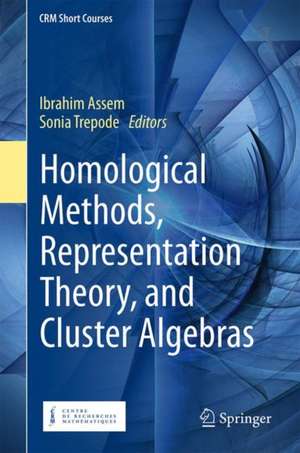Homological Methods, Representation Theory, and Cluster Algebras: CRM Short Courses
Editat de Ibrahim Assem, Sonia Trepodeen Limba Engleză Hardback – 27 apr 2018
This text presents six mini-courses, all devoted to interactions between representation theory of algebras, homological algebra, and the new ever-expanding theory of cluster algebras. The interplay between the topics discussed in this text will continue to grow and this collection of courses stands as a partial testimony to this new development. The courses are useful for any mathematician who would like to learn more about this rapidly developing field; the primary aim is to engage graduate students and young researchers. Prerequisites include knowledge of some noncommutative algebra or homological algebra. Homological algebra has always been considered as one of the main tools in the study of finite-dimensional algebras. The strong relationship with cluster algebras is more recent and has quickly established itself as one of the important highlights of today’s mathematical landscape. This connection has been fruitful to both areas—representation theory provides a categorification of cluster algebras, while the study of cluster algebras provides representation theory with new objects of study.
The six mini-courses comprising this text were delivered March 7–18, 2016 at a CIMPA (Centre International de Mathématiques Pures et Appliquées) research school held at the Universidad Nacional de Mar del Plata, Argentina. This research school was dedicated to the founder of the Argentinian research group in representation theory, M.I. Platzeck.
The six mini-courses comprising this text were delivered March 7–18, 2016 at a CIMPA (Centre International de Mathématiques Pures et Appliquées) research school held at the Universidad Nacional de Mar del Plata, Argentina. This research school was dedicated to the founder of the Argentinian research group in representation theory, M.I. Platzeck.
The courses held were:
- Advanced homological algebra
- Introduction to the representation theory of algebras
- Auslander-Reiten theory for algebras of infinite representation type
- Cluster algebras arising from surfaces
- Cluster tilted algebras
- Cluster characters
- Introduction to K-theory
- Brauer graph algebras and applications to cluster algebras
| Toate formatele și edițiile | Preț | Express |
|---|---|---|
| Paperback (1) | 334.82 lei 38-44 zile | |
| Springer International Publishing – 22 dec 2018 | 334.82 lei 38-44 zile | |
| Hardback (1) | 277.90 lei 22-36 zile | +27.96 lei 6-12 zile |
| Springer International Publishing – 27 apr 2018 | 277.90 lei 22-36 zile | +27.96 lei 6-12 zile |
Preț: 277.90 lei
Nou
Puncte Express: 417
Preț estimativ în valută:
53.19€ • 57.80$ • 44.71£
53.19€ • 57.80$ • 44.71£
Carte disponibilă
Livrare economică 31 martie-14 aprilie
Livrare express 15-21 martie pentru 37.95 lei
Preluare comenzi: 021 569.72.76
Specificații
ISBN-13: 9783319745848
ISBN-10: 3319745840
Pagini: 220
Ilustrații: XI, 223 p. 41 illus.
Dimensiuni: 155 x 235 x 19 mm
Greutate: 0.52 kg
Ediția:1st ed. 2018
Editura: Springer International Publishing
Colecția Springer
Seria CRM Short Courses
Locul publicării:Cham, Switzerland
ISBN-10: 3319745840
Pagini: 220
Ilustrații: XI, 223 p. 41 illus.
Dimensiuni: 155 x 235 x 19 mm
Greutate: 0.52 kg
Ediția:1st ed. 2018
Editura: Springer International Publishing
Colecția Springer
Seria CRM Short Courses
Locul publicării:Cham, Switzerland
Cuprins
Introduction to the Representation Theory of Finite-Dimensional Algebras: The Functorial Approach (M. I. Platzeck).- Auslander–Reiten Theory for Finite-Dimensional Algebras (P. Malicki).- Cluster Algebras From Surfaces (R. Schiffler).- Cluster Characters (P.-G. Plamondon).- A Course on Cluster Tilted Algebras (I. Assem).- Brauer Graph Algebras (S. Schroll).
Notă biografică
Ibrahim Assem is professor of mathematics at the University of Sherbrooke. Professor Assem’s research interest is in representation theory. He is a member of the Research Group on Algebra Representation Theory from the combined institutions: University of Sherbrooke and Bishop’s University.
Sonia Trepode is professor of mathematics at the Universidad Nacional de Mar del Plata, Argentina.
Sonia Trepode is professor of mathematics at the Universidad Nacional de Mar del Plata, Argentina.
Textul de pe ultima copertă
This text presents six mini-courses, all devoted to interactions between representation theory of algebras, homological algebra, and the new ever-expanding theory of cluster algebras. The interplay between the topics discussed in this text will continue to grow and this collection of courses stands as a partial testimony to this new development. The courses are useful for any mathematician who would like to learn more about this rapidly developing field; the primary aim is to engage graduate students and young researchers. Prerequisites include knowledge of some noncommutative algebra or homological algebra. Homological algebra has always been considered as one of the main tools in the study of finite-dimensional algebras. The strong relationship with cluster algebras is more recent and has quickly established itself as one of the important highlights of today’s mathematical landscape. This connection has been fruitful to both areas—representation theory provides a categorificationof cluster algebras, while the study of cluster algebras provides representation theory with new objects of study.
The six mini-courses comprising this text were delivered March 7–18, 2016 at a CIMPA (Centre International de Mathématiques Pures et Appliquées) research school held at the Universidad Nacional de Mar del Plata, Argentina. This research school was dedicated to the founder of the Argentinian research group in representation theory, M.I. Platzeck.
The six mini-courses comprising this text were delivered March 7–18, 2016 at a CIMPA (Centre International de Mathématiques Pures et Appliquées) research school held at the Universidad Nacional de Mar del Plata, Argentina. This research school was dedicated to the founder of the Argentinian research group in representation theory, M.I. Platzeck.
Caracteristici
Underscores cluster algebras—one of the most important highlights of today's mathematical landscape Addressed to graduate students, young researchers, and research mathematicians Assumes minimal previous knowledge from readers while still taking them deeply into theory






